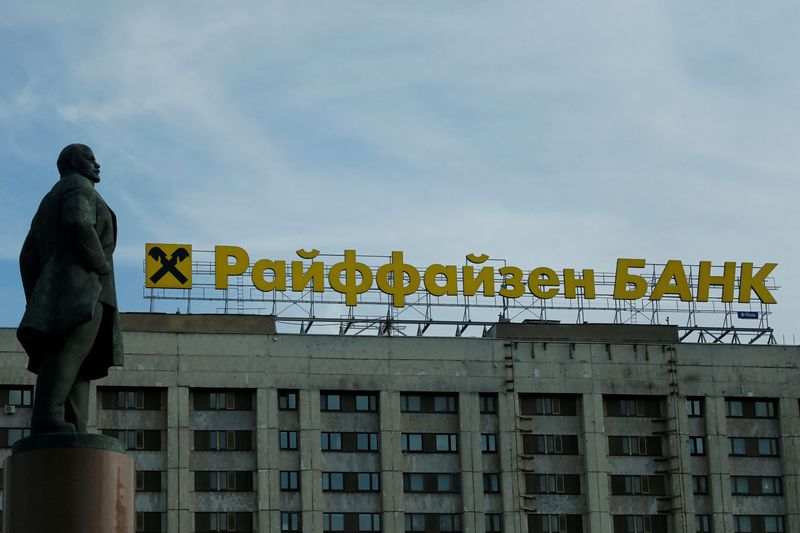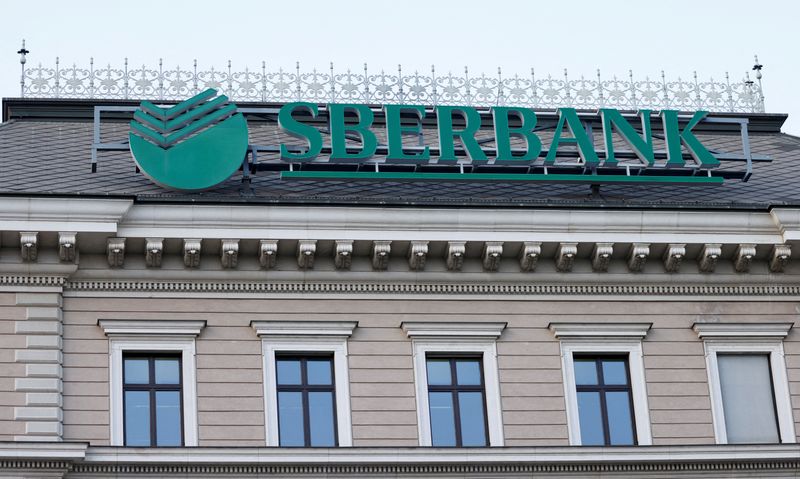FRANKFURT/LONDON (Reuters) -European bank shares halted their slide on Wednesday after dropping to their lowest level in nearly 11 months on fallout from the Ukraine crisis, which has forced the European arm of Russia’s Sberbank to close.
Russia has shown no intention of stopping its Ukraine attack, which has triggered heavy sanctions against Moscow and led to an exodus of big companies from the Russian market.
U.S. President Joe Biden has warned Vladimir Putin that the Russian leader “has no idea what’s coming”. Russia calls its Ukraine actions a “special operation”.
On Wednesday, the European Union said it was excluding seven Russian banks from the SWIFT messaging system, but stopped short of including those handling energy payments.
Meanwhile, Sberbank, which reported record profits in 2021, said it was leaving the European market as its subsidiaries faced large cash outflows and threats to the safety of employees and property.
The move by Russia’s biggest lender seemed inevitable after its European arm was closed by order of the European Central Bank.
Sberbank operated in Austria, Croatia, Germany and Hungary, among other countries, and had European assets worth 13 billion euros ($14.4 billion) on Dec. 31, 2020. Its London depository receipts have plunged 99.9% so far in 2022. “All sellers, no buyers,” said one London trader on Wednesday.
Regulators are also preparing for a possible closure of the European arm of Russia’s second-largest bank, VTB Bank, amid growing concerns about the impact of sanctions, Reuters reported on Wednesday.
Credit rating agency Fitch said western European banks’ asset quality will be pressured by the sanctions fallout and that they also face “materially increased operational risk.”
An index of leading European bank stocks was up 1.39% on Wednesday, erasing early losses that came on top of a 5.6% drop on Tuesday and 4.5% on Monday. Earlier on Wednesday, the index hit its lowest level since April 2021, down 27% from last month’s highs.
Austria’s Raiffeisen Bank International, which has operated in Russia since the collapse of the Soviet Union thirty years ago, has been one of the biggest fallers so far this week.
The bank is exploring leaving Russia, two people with knowledge of the matter told Reuters, a move that would make it the first European bank to do so since Moscow’s Ukraine invasion.
Raiffeisen shares, which are half the value of a month ago, pared some earlier losses on Wednesday to close down 2.66%.
Some finance officials are trying to reassure markets.
The capital position of Hungary’s OTP Bank, central Europe’s largest independent lender, is excellent and the bank can withstand further possible market shocks in Russia and Ukraine, Hungary’s central bank said in an emailed reply to Reuters.
Citigroup, which has $10 billion in exposure to Russia, could face billions of dollars of losses under the worst case scenario, although it expects its actual losses to be less than that, Chief Financial Officer Mark Mason said on Wednesday.
SHEDDING ASSETS
Germany’s market regulator BaFin said it was closely monitoring the European arm of VTB Bank, which was no longer accepting new clients.
The bank, headquartered in Frankfurt, had 8.1 billion euros of assets at the end of 2020.
On Tuesday, Russia said it was placing temporary restrictions on foreigners seeking to exit Russia assets, as it tried to stem an investor exodus.
But investors are continuing to shed assets. Aviva’s fund management business will divest its small exposure to Russia “as soon as we practically can,” chief executive Amanda Blanc said on Wednesday.
Financial companies are scrambling to keep up with the situation.
Dubai’s Mashreqbank has stopped lending to Russian banks and is reviewing its existing exposure to the country, Reuters reported.
The move is one of the first reported instances of a bank in the Middle East halting ties to Russia and underscores growing global nervousness about falling foul of Western sanctions.
France’s BNP Paribas said it was working to maintain its activities as much as possible at its Ukraine arm Ukrsibbank, which has close to 5,000 employees.
A task force at Germany’s Commerzbank, which has a subsidiary in Russia, is meeting multiple times a day, a board member has said.
($1 = 0.9022 euros)
(Additional reporting by Gergely Szakacs, Zuzanna Szymanska, Saeed Azhar and Yousef SabaEditing by Jane Merriman and Rosalba O’Brien)


























